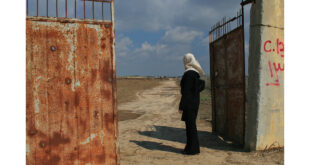Issue 38, Summer/Fall 2024 http://doi.org/10.70090/AMS.38.AH1 Scroll down for Arabic abstract. This study examines the use of conceptual metaphors—ontological, orientational, and structural—in the media discourse on the Syrian crisis, as presented on the websites of RT Arabic and BBC Arabic. By analyzing the metaphorical language embedded in news coverage, the research …
Read More »Conflict and Social Media Integration in Local News Gathering: A Study of Journalist Perceptions in Oman
Issue 38, Summer/Fall 2024 http://doi.org/10.70090/AMS.38.a1 Abstract Social media integration has transformed news gathering. This study explores the perceptions of journalists in Oman regarding the opportunities and challenges associated with utilizing social media in their newsroom operations. Through semi-structured interviews with journalists from the country’s only television station that produces news—Oman …
Read More »Arab Journalists’ Attitudes Toward the Use of Drones in Media Coverage of the Gaza War: Case Study of Al Arabiya Channel (Arabic)
Issue 38, Summer/Fall 2024 http://doi.org/10.70090/AMS.38.HAB1 Scroll down for Arabic abstract. This study investigates Arab journalists’ attitudes toward the use of drone technology in Al Arabiya Channel’s coverage of the Gaza War. Utilizing the survey method, data were collected through an online questionnaire distributed via Google Forms to a purposive sample …
Read More »Tweeting Solidarity Across Borders: A Social Network Analysis of pro-Palestinian Activism
Issue 38, Summer/Fall 2024 http://doi.org/10.70090/AMS.38.DT1 Abstract This research seeks to identify influential online actors on X and study the thematic narratives in the digital public sphere, with a specific focus on communications pertaining to Palestinian protests. In challenging the mainstream narratives propagated by traditional media outlets in some Western countries, …
Read More »Women and Conflict: Challenges and Risks Facing Women Journalists in the Gaza Strip During a Time of War
Issue 38, Summer/Fall 2024 http://www.doi.org/10.70090/AMS.38.ROKA Abstract This paper examines the situation of women journalists during the current war in Gaza (2023-2025) after the events of October 7, 2023. The situation of women journalists is examined through the framework of gender as it pertains to conflict and war reporting, focusing on …
Read More »The Role of Virtual Social Presence in Arab Audience Acceptance of AI in Media Practices: Insights from the Technology Acceptance Model
Issue 37, Winter/Spring 2024 https://doi.org/10.70090/MH24RVSP Abstract The integration of artificial intelligence (AI) into media has rendered it crucial to comprehend public acceptance of this technology. The four comprehensive models developed and tested in this research employ structural equation modelling, which offers a thorough analysis of the factors influencing public acceptance …
Read More »Trends of Arab Media Studies in the Field of Artificial Intelligence: A Critical and Analytical Study (Arabic)
Issue 37, Winter/Spring 2024 https://doi.org/10.70090/AAS24AAI Abstract This study analyzes trends in Arab literature that address the use of artificial intelligence (AI) technology in mass media. The research relies on a meta-analysis, or secondary analysis, and incorporates both quantitative and qualitative approaches. The study examines all Arab media studies conducted in …
Read More »Engaging Youth in History Through Immersive Storytelling: A Case Study of the ‘Once Upon a Time in Palestine’ XR Documentary
Issue 37, Winter/Spring 2024 https://doi.org/10.70090/SS24EYVR Abstract This paper explores the Once Upon a Time in Palestine XR Documentary as a case study to investigate the potential of virtual and augmented reality technologies in reshaping historical narratives through immersive stories that engage youth with history. The documentary recounts the oral history …
Read More »Artificial Intelligence Divide Between Digital Immigrants and Natives in Egypt (Arabic)
Issue 37, Winter/Spring 2024 https://doi.org/10.70090/AFA24DDI Abstract The study explores the artificial intelligence (AI) divide in Egypt while considering the moderating influence of age/generation. The research compares digital natives born in the digital age vis-à-vis digital immigrants who grew up in less technologically adapted environments. The study uses the UTAUT2 model …
Read More »Examining AI Integration by Audio-Visual Media Platforms in Oman: A Qualitative Analysis of Media Professionals’ Perspectives
Issue 37, Winter/Spring 2024 https://doi.org/10.70090/ES24EAII Abstract This study aims to understand the perspectives and experiences regarding AI adoption in the daily work of Omani media professionals. This research, which explores the prospects, pitfalls, and consequences of AI integration in media production and distribution within Oman, focuses on those involved in …
Read More » Arab Media & Society The Arab Media Hub
Arab Media & Society The Arab Media Hub










